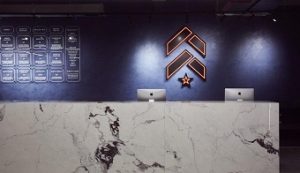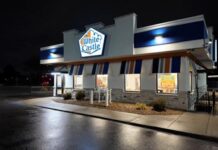
Lock manufacturer Mul-T-Lock has provided all seven of Barry’s studios in London with its eCLIQ® locks and over 100 accompanying keys in order to manage access rights across each studio. Founded in 1998 in West Hollywood, Barry’s fitness classes soon became known throughout the world, with studios opening up across America and Canada, in the Middle East and throughout Europe.
There are over 140,000 global members of Barry’s FitFam, with eight boutique studios in the UK. London-based Astoria Fire and Security Ltd recommended Mul-T-Lock’s eCLIQ® access control solution to all seven of Barry’s studios throughout London, to help combat lost keys and achieve complex access requirements.
Fraser McNair, Contracts Manager at Astoria Fire and Security commented: “Mul-T-Lock’s eCLIQ® system has enabled us to program locks and cut keys without traditional locksmithing skills or equipment, which is invaluable to a specialist fire and security company such as ours.”
“The convenience and cost saving to our customer has also meant that the product has virtually sold itself and it gives them the control to manage their security directly from a phone application that is both secure and easy to use. They can now reconfigure their security within minutes themselves and lost keys can be cancelled immediately. They also have the added convenience of only granting access rights on certain days at certain times depending on the role of the key holder.”
With a number of employees that require access to the studios at various times of the day/week and with confidential client data kept on file within each building, Barry’s required a solution that would offer a high level of physical security as well as data protection.
Mul-T-Lock’s eCLIQ® access control system allows end-users to both grant and remove access permissions remotely. This includes the ability to schedule individual access permissions for each key, as well as to provide time-limited access. If a key is lost, access can also be revoked using the eCLIQ® software, all managed from a cloud-based system. The eCLIQ® system is particularly useful for leisure facilities that often suffer from a high staff turnover. Having the ability to remove access permissions when a member of staff leaves allows facilities managers and business owners to uphold their security and the safety of visitors and staff.
This not only offers enhanced security, but also significantly reduces whole life costing. In the past, when a mechanical key is lost, security can only be guaranteed by replacing the whole mechanical suite of locks – at an unwelcome cost and often disruption to ‘business as usual’ for facilities. Locks can also be easily removed and moved to a new site without the need for expensive rewiring found in most other access control systems.
Jacques Vermeulen, Regional Sales Manager for Mul-T-Lock added: “Fitness studios and gyms have very complex access and security requirements, with 24-hour shift patterns for staff, deliveries throughout the day, and contractors needing one-time access. Plus, the management of visitors and their flow around a building, needs to be non-intrusive yet secure and reassuring.”
“Even though keys provide physical access to critical assets within gyms and health clubs, including areas that house servers holding customer data, and to offices where customers’ accounts are managed, we often see end-users unsure of how many keys they have in circulation, or where they are at any given time. More worryingly, often when staff leave there is no system to revoke access or monitor if they return the keys.”
“The safety and security of visitors and staff is paramount for any customer facing business, but in such a competitive industry the smooth running and ongoing service can be vital to its success and profitability. Security and access systems, such as eCLIQ® from Mul-T-Lock, not only improves safety and mitigates risk but also helps with business continuity, which is a valuable asset to the leisure industry.”











